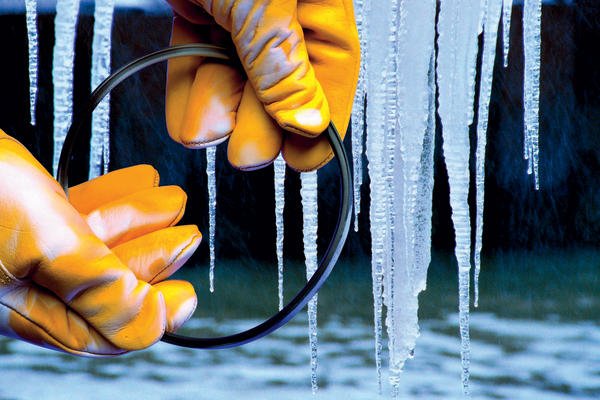V74C and V61C elastomer seals are coming to the aid of pump manufacturers and chemical engineers facing high and low-temperature pumping. The V74C grade is designed for high-temperature pump applications up to 200 °C combined with increased chemical resistance. It retains its mechanical properties longer than conventional FKM grades, allowing extended seal service life. The V61C fluoroelastomer works effectively down to -40 °C.
High and low-temperature pumping environments have long posed particular problems for chemical engineers. The default position for many is to opt for either a metal ring seal or even a seal-less pump design. Yet there’s no getting away from the benefits of elastomers seals in reducing pump wear and operational performance. One advantage of elastomers is the ease with which their physical properties can be modified to better suit the working environment. By making changes to the filler system, it is possible to optimise the physical properties of a particular grade of elastomeric material when compared to others within the same grade. Typical dynamic applications include pump sealing against a reciprocating or rotating shaft or bore. The compression of the material, combined with shear frictional forces, can result in tensile stresses that exceed the ultimate tensile strength of the material, causing a tensile failure. In this case, using a filler with a large surface area and a small particle size would be a better choice than the standard reinforcing filler.
Heat damage is a common cause of pump seal failure. Running a rotary pump or compressor longer, under more extreme working conditions, creates increased thermal stresses on both the pump and seals. Although pumps should be designed with sufficient cooling in mind, the heat-soak during shutdown can damage the seal or at least reduce its life. For this reason, it should be borne in mind that the temperature of the process is not necessarily what the seal will actually have to withstand. It could be lower or higher depending upon the location of the seal and the effectiveness of the cooling system. Here it is critical that the correct sealing material is selected at the outset. As a general rule, elastomer temperature resistance varies from 90 °C for natural rubber (NR) through to 330 °C for perfluoroelastomers (FFKM), with other elastomers offering temperature resistance in-between these values. If the problem continues, it may be necessary to either modify the design of the seal or change its location. It should also be noted that an elastomer’s physical properties vary with temperature, in other words a material that has a tensile strength at ambient temperature of 10 MPa will be significantly weaker at 200 °C. Whilst standardisation to ASTM testing is useful for comparison purposes between seal manufacturers, it is more important for the pump manufacturer that material data is calculated under real application conditions and not simply laboratory generated.
Increased efficiency
By applying the principles of seal customisation described earlier, PPE has developed a high-temperature fluoroelastomer (FKM) that features reduced compression set and ageing at high temperature. The V74C grade is designed for high-temperature pump applications up to 200 °C combined with increased chemical resistance. With an industry leading compression set of just 5 % that minimises the effect of high-temperature ageing, PPE has engineered V74C such that it retains its mechanical properties longer than conventional FKM grades, allowing extended seal service life, increased efficiency and reduced noise. Low-temperature applications for fluoroelastomers have until now been limited to -30 °C. By modifying the polymer network architecture, it is now possible for fluoroelastomers to work effectively down to -40°C as exhibited by the V61C fluoroelastomer grade.
The V74C and V61C grades present chemical engineers, pump manufactures and service organisations with the opportunity to increase service intervals, prevent leaks and generally increase the efficiency of their pumps. Moreover, the improved sealing efficiency provided by V74C and V61C will allow pumps to run quieter, an impor-tant consideration in enclosed environments. Both fluoroelastomers exhibit the same chemical and mechanical properties as conventional FKM grades. They are available in almost any sized O-ring (standard and non-standard) as well as in custom parts.
cpp 432
Seals
Elastomer materials
European Sealing Association
Share:







